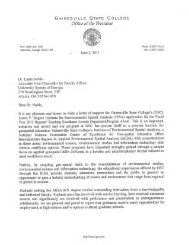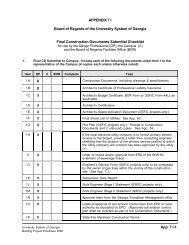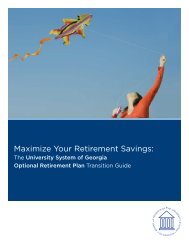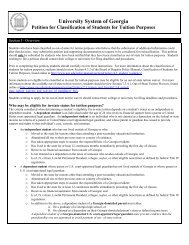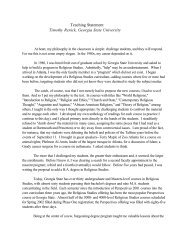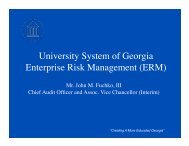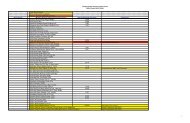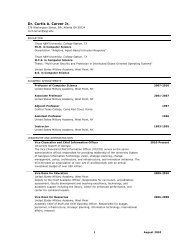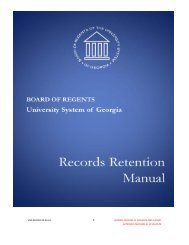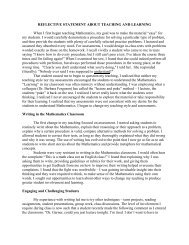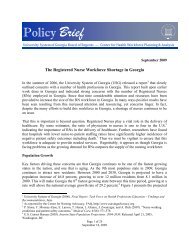66928 Federal Register / Vol. 75, No. 209 / Friday, October 29, 2010 / Rules and RegulationsWReier-Aviles on DSKGBLS3C1PROD with RULES2Changes: None.Administration <strong>of</strong> Tests (§ 668.151)Comment: One commenter provided anumber <strong>of</strong> suggestions regarding testadministration security, includingrequiring that (1) test publishers contactthe <strong>Department</strong> when tests are beingused for ATB and non-ATB purposes,(2) different versions <strong>of</strong> the test be usedfor different purposes so that oneversion is used exclusively for ATBpurposes, (3) ATB tests only be shippedto test administrators and not toinstitutions, and (4) ATB tests be lockedin an area that cannot be accessed bynon-certified test administrators.Discussion: Many ATB tests that havebeen submitted to the Secretary andsubsequently approved for title IV, HEAstudent eligibility purposes are alsoused for general academic placementpurposes not related to ATB. Regardingthe suggestion that test administratorsreport to the <strong>Department</strong> when a test isused for ATB purposes, beginning withthe 2011–2012 award year, we willbegin collecting information on the use<strong>of</strong> an ATB test for each student whoreceives title IV, HEA funds; thereforetest administrators will not have toprovide the information to us. In terms<strong>of</strong> requiring that approved ATB testsmust be used exclusively for this singlepurpose, that would require a statutorychange. While it has been suggested thatwe revise the regulations to allow ATBtests only be shipped to testadministrators and not to institutions,we believe that this is not feasible giventhat ATB tests are used both for title IV,HEA eligibility and non-title IVpurposes, such as for course placementpurposes. Finally, while it may bepossible that at the discretion <strong>of</strong> theinstitution’s assessment center (or as aresult <strong>of</strong> an agreement between the testpublisher or State and the institution)that ATB tests be locked in an area onlyaccessible by certified testadministrators, this may be impracticalsince these tests are used for non-title IVeligibility purposes.Changes: None.Comment: A commenter indicatedthat for computer-based tests,institutions maintain the associatedsystem components on their computers,so test administrators (particularlyindependent test administrators) cannotbe held responsible for maintaining thesecurity <strong>of</strong> these types <strong>of</strong> tests, otherthan during the test administration.For paper-and-pencil tests, thecommenter expressed strong concernsregarding independent testadministrators being held responsiblefor storing test materials. Thecommenter stated that independent testadministrators <strong>of</strong>ten do not have accessto secure storage, other than at thecampuses where they administer thetest. Use <strong>of</strong> their home or automobile forstorage and transportation to test sites isclearly unacceptable for security.Institutions typically have a securelocation (a locked facility to which onlythe test administrator and possibly aselect few individuals have a key) wherematerials can be stored. In addition,many institutions use the same testforms for ATB purposes and otherpurposes, and thus would already havecopies <strong>of</strong> the test forms in storage at theinstitution. The commenter argued thatmaintaining test forms at the institutionwhile emphasizing the chain <strong>of</strong> custody,under written agreements, will bettercontribute to the goal <strong>of</strong> keeping testforms secure.Discussion: We disagree. Proposed§ 668.144(c)(16) and (d)(7) require testpublishers and States, respectively, toensure not only that the testadministrator has the training,knowledge, skill and integrity to teststudents in accordance with therequirements <strong>of</strong> this subpart, and therequirements <strong>of</strong> the test administrationtechnical manual, but also, that the testadministrator has the ability andfacilities to keep the ATB tests secureagainst disclosure or release. We believethat these requirements are reasonable,and prudent, and will help ensure theintegrity <strong>of</strong> ATB tests. While at thistime, we are not prescribing how testpublishers or States must make thesedeterminations about their testadministrators, we expect that they willbase their determinations on themeasures taken by the test administratorto protect the security <strong>of</strong> the tests. Forexample, one could envision a testadministrator satisfying thisrequirement by having a secure safe inthe assessment center where onlycertified test administrators had the keyor combination to obtain the tests. In thecase <strong>of</strong> an independent testadministrator, one could envision thetest administrator satisfying therequirement by maintaining the tests ina mobile, portable safe or some othersecure device. As these examplesillustrate, test publishers and States willbe required to distinguish betweensecure and non-secure methods <strong>of</strong>storing ATB tests that limit access andprotect against unintended release ordisclosure if these tests are going tocontinue to be used for ATB purposes,otherwise the Secretary will considerthat the test is improperly administered.Changes: None.VerDate Mar2010 14:10 Oct 28, 2010 Jkt 223001 PO 00000 Frm 00098 Fmt 4701 Sfmt 4700 E:\FR\FM\29OCR2.SGM 29OCR2Administration <strong>of</strong> Tests for IndividualsWhose Native Language Is Not Englishor for Individuals With Disabilities(§ 668.153)Comment: One commenter noted thatif a non-English speaking student is ina program <strong>of</strong> study which is taught inthe student’s native language and theprogram also has an ESL component orthat at least a portion <strong>of</strong> the programwill be taught in English, there are twoaspects that need to be tested, thestudent’s reading, verbal andquantitative skills in their own nativelanguage, as well as, their knowledge <strong>of</strong>English in order to understand theportion <strong>of</strong> the program taught inEnglish. The commenter expressedconcern regarding the timing <strong>of</strong> thesetests.Discussion: We appreciate thiscomment because it highlights the needto address a situation not covered by theproposed regulations. Under proposed§ 668.153(a)(1), we require institutionsto use an ATB test in the student’snative language when the student’snative language is other than Englishand the student will be enrolled in aprogram that is taught in the student’snative language. Paragraphs (a)(2) and(a)(3) <strong>of</strong> proposed § 668.153 addresssituations where individuals who arenot native speakers <strong>of</strong> English and whoare not fluent in English are enrolled (orplan to enroll) in a program (a) that istaught in English with an ESLcomponent and (b) that is taught inEnglish without an ESL component,respectively. The proposed regulationsdo not address what happens in the case<strong>of</strong> a non-English speaker who isenrolled or plans on enrolling in aprogram that will be taught in his or hernative language that includes an ESLcomponent or a portion <strong>of</strong> the programwill be taught in English. In situationssuch as these, we believe thatinstitutions should require the studentto take an English pr<strong>of</strong>iciencyassessment approved under § 668.148(b)prior to when the English or ESLportion <strong>of</strong> the program commences.Changes: We have added a newparagraph (a)(5) to § 668.153 to providethat if the individual is a non-nativespeaker <strong>of</strong> English who is enrolled orplans to enroll in a program that will betaught in his or her native language andthe program includes an ESLcomponent or a portion <strong>of</strong> the programwill be taught in English, the individualmust take a test approved under§§ 668.146 and 668.148(a)(1) in thestudent’s native language. This newparagraph also provides that prior to thebeginning <strong>of</strong> the ESL component orwhen the English portion <strong>of</strong> the program
Federal Register / Vol. 75, No. 209 / Friday, October 29, 2010 / Rules and Regulations66929WReier-Aviles on DSKGBLS3C1PROD with RULES2commences, the individual must take anEnglish pr<strong>of</strong>iciency test approved under§ 668.148(b).Comment: One commenter suggestedthat most test administrators do nothave the training or experience todetermine appropriate accommodationsfor students with disabilities, and thusare not qualified to identify or providean appropriate accommodation. Thiscommenter argued that test publishersand States should not be heldaccountable for training testadministrators in the intricacies <strong>of</strong> lawsregarding the rights <strong>of</strong> persons withdisabilities. The commenter stated that,to protect the privacy <strong>of</strong> the examinee,the test administrator should not needto know the specifics <strong>of</strong> the disability.This commenter argued that the testadministrator only needs to know whatthe accommodation is. For this reason,the commenter recommended that thetest administrator only be required toverify that the institution has providedthe appropriate documentation <strong>of</strong> thestudent’s disability, as described in§ 668.153(b)(4). It was the commenter’sview that the responsibility fordetermining the appropriateaccommodation for the student’sdisability lies with the institution’s staff.Discussion: We agree that testadministrators may not have extensivetraining or experience to determinewhether or not a requestedaccommodation is appropriate.However, each test must beadministered in accordance with thetest publisher’s or State’s technicalmanual. Consistent with proposed§ 668.144(c)(11)(vii) and (d)(11)(vii), thetechnical manual must includeadditional guidance on theinterpretation <strong>of</strong> scores resulting fromany modifications <strong>of</strong> the test forindividuals with disabilities. We expectthat a test publisher or State willprovide examples in the technicalmanual <strong>of</strong> the types <strong>of</strong> both allowableand non-allowable accommodationsassociated with a range <strong>of</strong> temporaryimpairments and for individuals withdisabilities in order to insure that thetest administrator has the necessaryprotocols to follow to ensure thevalidity <strong>of</strong> the test administrationprocess, while allowing for a range <strong>of</strong>specialized needs to be met. While theseexamples <strong>of</strong> allowable and nonallowableaccommodations cannot beexhaustive, we will expect them to beexpansive so that test administratorshave clear examples <strong>of</strong> how theapproved tests can and cannot be usedfor individuals with temporaryimpairments and for individuals withdisabilities. These protocols mayinclude, for example, the use, whenappropriate, <strong>of</strong> alternative tests (e.g.,approved audio-recorded ATB tests forindividuals who are blind) andproviding a test-taker whose vision isimpaired (as documented by aphysician) additional time to completean approved large print version <strong>of</strong> anATB test. To make this expectationclearer, we will revise§ 668.144(c)(11)(vii) and (d)(11)(vii) torequire a test’s technical manual toinclude additional guidance on thetypes <strong>of</strong> accommodations that areallowable for individuals withtemporary impairments or individualswith disabilities and the interpretation<strong>of</strong> scores resulting from anymodifications <strong>of</strong> the test for individualswith temporary impairments orindividuals with disabilities.Changes: We have modified§ 668.144(c)(11)(vii)and (d)(11)(vii) torequire the test manual to include, inaddition to guidance on theinterpretation <strong>of</strong> scores resulting frommodification <strong>of</strong> the test for individualswith temporary impairments orindividuals with disabilities, guidanceon the types <strong>of</strong> accommodations that areallowable.Disbursements (§§ 668.164(i),685.102(b), 685.301(e), 686.2(b), and686.37(b))Provisions for Books and Supplies(§ 668.164(i))Comment: Several commenters agreedwith the proposal in § 668.164(i) torequire an institution to provide, undercertain conditions, a way for a FederalPell Grant eligible student to obtain orpurchase required books and suppliesby the seventh day <strong>of</strong> a payment period.Various commenters noted theacademic importance <strong>of</strong> enablingstudents to have early access to theirbooks and supplies. However, some <strong>of</strong>these commenters argued that bookstorevouchers were not the most affordableoption for students, noting that undercurrent guidance an institution thatissues vouchers in lieu <strong>of</strong> cash mustdemonstrate it provides students ‘‘a realand reasonable opportunity’’ to obtainmaterials from other vendors.Two commenters requested that theregulations also apply to students whoare eligible for the Iraq and AfghanistanService Grants.Various commenters believed theproposed regulations would beadministratively difficult andburdensome to carry out. One <strong>of</strong> thecommenters stated that institutions withnonterm programs would have specialadministrative problems meeting theproposed regulations because <strong>of</strong>different start dates and differentVerDate Mar2010 14:10 Oct 28, 2010 Jkt 223001 PO 00000 Frm 00099 Fmt 4701 Sfmt 4700 E:\FR\FM\29OCR2.SGM 29OCR2payment period completion rates forstudents. Another commenter requestedthe <strong>Department</strong> to delay implementingthe regulations so that institutions havesufficient time to make needed s<strong>of</strong>twareand procedural changes. Onecommenter believed that the studentshould be required to initiate a requestto obtain or purchase books andsupplies instead <strong>of</strong> requiring aninstitution to perform this process for allFederal Pell Grant eligible students.Discussion: Because we haveidentified situations where low-costinstitutions delay disbursing funds foran extended time, or make partialdisbursements to cover costs for onlytuition and fees, the <strong>Department</strong>believes that these provisions areessential in enabling needy students topurchase books and supplies at thebeginning <strong>of</strong> the term or enrollmentperiod. Moreover, we find it troublingthat disbursement delays at someinstitutions may force very needystudents to take out private loans to payfor books and supplies that wouldotherwise be paid by Federal Pell Grantfunds.We believe that the regulations in§ 668.164(i) provide an appropriatebalance between the need for FederalPell Grant eligible students to be able topurchase or obtain books and suppliesearly in the payment period and theadministrative needs <strong>of</strong> institutions. Forexample, an institution may issue abookstore voucher, make a cashdisbursement, issue a stored-value card,or otherwise extend credit to students tomake needed purchases. The institutionhas the flexibility to choose one or more<strong>of</strong> these methods or a similar methodbased on its administrative needs andconstraints or an evaluation <strong>of</strong> the costsand benefits <strong>of</strong> implementing one ormore <strong>of</strong> these methods.With regard to the request to expandthe scope <strong>of</strong> the regulations to includerecipients <strong>of</strong> Iraq and AfghanistanService Grants, we believe that studentswho are not eligible for a Federal PellGrant should have sufficient resources,as indicated by their higher expectedfamily contributions, to purchase booksand supplies. We note however, thatnothing in these regulations prevents aninstitution from making credit balancefunds available early in the paymentperiod to any student.In response to concerns aboutadministrative issues for nontermprograms, we note that for purposes <strong>of</strong>the Federal Pell Grant Program aninstitution is already responsible forknowing when a student has eithercompleted a payment period or starteda payment period. These regulations fallwithin that framework.
- Page 1 and 2:
Friday,October 29, 2010Part IIDepar
- Page 3 and 4:
Federal Register / Vol. 75, No. 209
- Page 6 and 7:
66836 Federal Register / Vol. 75, N
- Page 8 and 9:
66838 Federal Register / Vol. 75, N
- Page 10 and 11:
WReier-Aviles on DSKGBLS3C1PROD wit
- Page 12 and 13:
66842 Federal Register / Vol. 75, N
- Page 14 and 15:
66844 Federal Register / Vol. 75, N
- Page 16 and 17:
WReier-Aviles on DSKGBLS3C1PROD wit
- Page 18 and 19:
66848 Federal Register / Vol. 75, N
- Page 20 and 21:
66850 Federal Register / Vol. 75, N
- Page 22 and 23:
WReier-Aviles on DSKGBLS3C1PROD wit
- Page 24 and 25:
66854 Federal Register / Vol. 75, N
- Page 26 and 27:
WReier-Aviles on DSKGBLS3C1PROD wit
- Page 28 and 29:
66858 Federal Register / Vol. 75, N
- Page 30 and 31:
66860 Federal Register / Vol. 75, N
- Page 32 and 33:
66862 Federal Register / Vol. 75, N
- Page 34 and 35:
66864 Federal Register / Vol. 75, N
- Page 36 and 37:
66866 Federal Register / Vol. 75, N
- Page 38 and 39:
WReier-Aviles on DSKGBLS3C1PROD wit
- Page 40 and 41:
WReier-Aviles on DSKGBLS3C1PROD wit
- Page 42 and 43:
66872 Federal Register / Vol. 75, N
- Page 44 and 45:
WReier-Aviles on DSKGBLS3C1PROD wit
- Page 46 and 47:
WReier-Aviles on DSKGBLS3C1PROD wit
- Page 48 and 49: WReier-Aviles on DSKGBLS3C1PROD wit
- Page 50 and 51: 66880 Federal Register / Vol. 75, N
- Page 52 and 53: WReier-Aviles on DSKGBLS3C1PROD wit
- Page 54 and 55: 66884 Federal Register / Vol. 75, N
- Page 56 and 57: 66886 Federal Register / Vol. 75, N
- Page 58 and 59: WReier-Aviles on DSKGBLS3C1PROD wit
- Page 60 and 61: WReier-Aviles on DSKGBLS3C1PROD wit
- Page 62 and 63: WReier-Aviles on DSKGBLS3C1PROD wit
- Page 64 and 65: WReier-Aviles on DSKGBLS3C1PROD wit
- Page 66 and 67: WReier-Aviles on DSKGBLS3C1PROD wit
- Page 68 and 69: WReier-Aviles on DSKGBLS3C1PROD wit
- Page 70 and 71: WReier-Aviles on DSKGBLS3C1PROD wit
- Page 72 and 73: 66902 Federal Register / Vol. 75, N
- Page 74 and 75: WReier-Aviles on DSKGBLS3C1PROD wit
- Page 76 and 77: WReier-Aviles on DSKGBLS3C1PROD wit
- Page 78 and 79: 66908 Federal Register / Vol. 75, N
- Page 80 and 81: WReier-Aviles on DSKGBLS3C1PROD wit
- Page 82 and 83: 66912 Federal Register / Vol. 75, N
- Page 84 and 85: WReier-Aviles on DSKGBLS3C1PROD wit
- Page 86 and 87: 66916 Federal Register / Vol. 75, N
- Page 88 and 89: WReier-Aviles on DSKGBLS3C1PROD wit
- Page 90 and 91: WReier-Aviles on DSKGBLS3C1PROD wit
- Page 92 and 93: WReier-Aviles on DSKGBLS3C1PROD wit
- Page 94 and 95: 66924 Federal Register / Vol. 75, N
- Page 96 and 97: WReier-Aviles on DSKGBLS3C1PROD wit
- Page 100 and 101: WReier-Aviles on DSKGBLS3C1PROD wit
- Page 102 and 103: 66932 Federal Register / Vol. 75, N
- Page 104 and 105: WReier-Aviles on DSKGBLS3C1PROD wit
- Page 106 and 107: 66936 Federal Register / Vol. 75, N
- Page 108 and 109: 66938 Federal Register / Vol. 75, N
- Page 110 and 111: 66940 Federal Register / Vol. 75, N
- Page 112 and 113: 66942 Federal Register / Vol. 75, N
- Page 114 and 115: 66944 Federal Register / Vol. 75, N
- Page 116 and 117: 66946 Federal Register / Vol. 75, N
- Page 118 and 119: WReier-Aviles on DSKGBLS3C1PROD wit
- Page 120 and 121: WReier-Aviles on DSKGBLS3C1PROD wit
- Page 122 and 123: WReier-Aviles on DSKGBLS3C1PROD wit
- Page 124 and 125: 66954 Federal Register / Vol. 75, N
- Page 126 and 127: WReier-Aviles on DSKGBLS3C1PROD wit
- Page 128 and 129: 66958 Federal Register / Vol. 75, N
- Page 130 and 131: 66960 Federal Register / Vol. 75, N
- Page 132 and 133: WReier-Aviles on DSKGBLS3C1PROD wit
- Page 134 and 135: WReier-Aviles on DSKGBLS3C1PROD wit
- Page 136 and 137: WReier-Aviles on DSKGBLS3C1PROD wit
- Page 138 and 139: 66968 Federal Register / Vol. 75, N
- Page 140 and 141: 66970 Federal Register / Vol. 75, N
- Page 142 and 143: 66972 Federal Register / Vol. 75, N
- Page 144 and 145: 66974 Federal Register / Vol. 75, N



